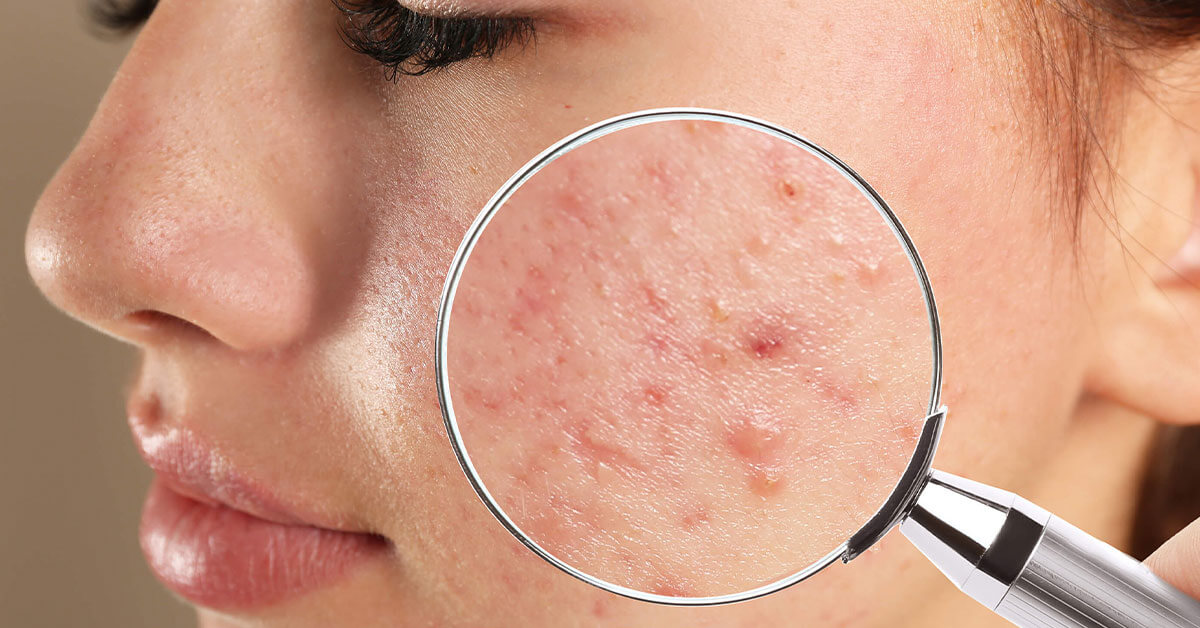Acne is a very common skin condition that affects people of all ages, but it is especially prevalent in teenagers. In fact, according to the American Academy of Dermatology, approximately 85% of people between the ages of 12 and 24 will experience at least some form of acne. Understanding why you get acne is a complicated combination of factors. One thing that is not part of the cascade causing acne is “being dirty.” Unfortunately, this is a common belief that acne is caused by having dirty skin. This is not true and can cause emotional damage to teenagers.
So, what causes acne breakouts?
You see, your skin makes this special oil called sebum to keep your skin moisturized. The glands that produce sebum are under hormonal control, and sometimes they get clogged up, causing “clogged pores,” what we dermatologists call comedones, and you probably call “whiteheads and blackheads” So, as you can see, it is not the “dirt” that clogs the pores, it is body’s natural oils. This is where acne starts, and then inflammation follows and causes “pimples”
Why are some people more prone to getting clogged pores? That depends on your genetics, hormones, and the natural bacteria on your skin called P. acnes.
Genetics: We can’t change the fact that mom or dad also got ad acne 🙂
Hormones: puberty is full of changes, and one of those changes is an increase in hormones. These hormones can cause the oil glands in your skin to produce more oil than usual, clogging your pores and leading to breakouts. Again, not much we can do – we need these hormones to grow 🙂
Bacteria: P. acne (Propionibacterium acnes), now called Cutibacterium acnes, is a resident bacterium on everyone’s skin. But in the context of sebum and dead skin cells, etc., it can proliferate and cause the recruitment of inflammatory cells. This contributes to inflammatory acne, known as “zits,” that is red, swollen, and full of white debris.
I must add that this traditional view of what causes acne is now being challenged by newer studies that show there may be sub-clinical inflammation on the skin even before comedones start or that “zits” can arise from normal skin (as opposed to always from comedones). We need more research in this area, but it is worth mentioning that new research is shedding more light on acne processes.
Tips for Managing Teen Acne
There are a few things teens can do to manage their breakouts. First, it’s important to be gentle with their skin. Harsh scrubs and cleansers will not help and hurt the skin by irritating already inflamed skin. Instead, we recommend using a gentle cleanser twice daily to remove oil, sweat, makeup, etc., without drying out or irritating the skin.
Speaking of irritating and traumatizing the skin, it is crucial to keep your hands off the face as much as possible. Resist the urge to pick or pop pimples— because acne comes and goes, but scars are permanent. Picking at your lesions can lead to pigmentation and scarring, which are much harder to treat than actual acne.
How Can Parents Help?
This one may shock you, but studies have shown that parents reminding and encouraging their teenagers to wash their faces or use acne products typically backfires. Teenagers see that as “parents nagging yet about another thing” [no comments from a mom here :)]. Professional help has been shown to be the most effective way to get help for your teenagers. Have your pediatrician or dermatologist discuss good skin habits with your child. It is much more effective. Also, remember that acne is a chronic skin disease and wax and wanes. Therefore, frequent visits to dermatologists are needed to adjust the treatment based on the status of your teenager’s skin.
If over-the-counter treatments are ineffective, you may consider taking your teenager to a board-certified dermatologist. Several prescription medications can be very effective in treating acne.
Next is to wash their pillowcase 1-2 times per week, especially if your child uses hair styling products. If they play sports pay attention to the helmets, shoulder straps, and chin straps- they can all worsen acne by mechanical friction.
There are good over-the-counter medications to start with, but if you are not getting results in 2-3 months, it is time to see a dermatologist.
Stress has been shown to worsen acne – college kids get worsening of their acne during the final weeks. Encourage a healthy lifestyle and exercise. Although we always recommend healthy dietary choices, there are not enough studies to support the elimination of any food groups. The one exception is high-sugar foods. Sugary foods, candy, soda, and juices cause a surge in insulin, contributing to the worsening of acne.
Remember that some medications your child may need to take for other health reasons, such as anabolic steroids taken for fitness, can worsen acne. Discuss this with your physician.
Last but not least, educate your children on fads and fake science on social media. Skincare is a billion-dollar industry, and there is no shortage of entities taking advantage of teenagers desperate for more self-esteem through clear skin.
In summary, acne is a very common skin condition that affects people of all ages but is especially prevalent in teenagers. Although there is no surefire way to prevent teenage acne, there are steps to help acne and professional services to treat acne. If over-the-counter treatments are ineffective, you may want to consider taking your teenager to see a board-certified dermatologist for further treatment options.
We invite you to fill out our contact form or call JUVIVE Dermatology at (949) 432-7432 to schedule a consultation today. We will be happy to answer any questions and help determine an accurate diagnosis and the best treatment options for your family.


